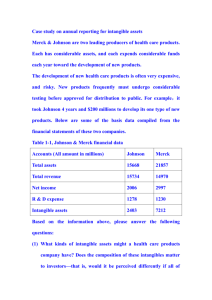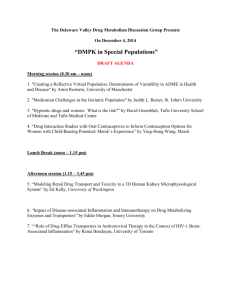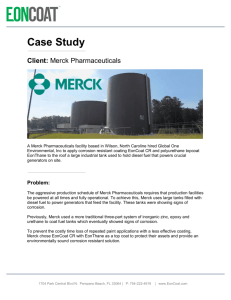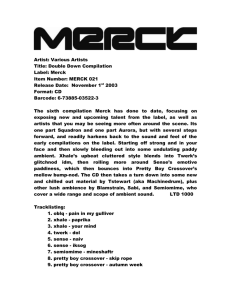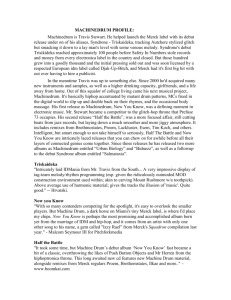merck trade compliance and export control policy
advertisement
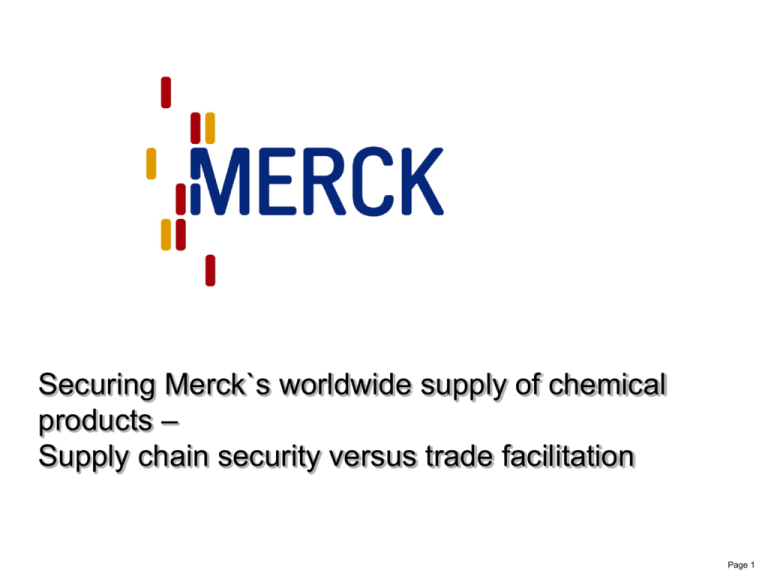
Securing Merck`s worldwide supply of chemical products – Supply chain security versus trade facilitation Page 1 “Securing Merck`s worldwide supply of chemical products – Supply chain security versus trade facilitation” The aim of the case study is to show how new legal requirements can be implemented smoothly and put into practice appropriately. Page 2 Manufacture of Cocaine Approximate Quantities Required for the Manufacture of 100 kilograms Cocaine-hcl Coca Leaf Sulfuric Acid (100 to 400 liters) Coca Paste Cocaine Base Cocaine Hydrochloride (100 kilograms) Potassium Permanganate 20 kilograms Acetone/ Ethyl Ether/ Methyl Ethyl Ketone/ Toluene (1500 to 2000 liters) Hydrochloric Acid (30 liters) Page 3 Dual-Use – Australia Group BAFA Einschätzung Kampfstoffe.xls Item No 803273 814310 814553 801658 800945 841645 450182 101160 458027 870348 101575 159508 800140 841509 800555 803646 Product Name 2-(DIETHYLAMINO)-ETHANOL for Synthesis 2-(DIETHYLAMINO)-ETHANTHIOL for Synthesis 2-(DIISOPROPYLAMINO)ETHYLCHLORIDHYDROCHLORID for Synthesis 2-BROMACETOPHENON for Synthesis 2-CHLORETHANOL for Synthesis 3,3-DIMETHYL-2-BUTANON for Synthesis AMMONIUMHYDROGENDIFLUORID GPR(TM) AMMONIUMHYDROGENDIFLUORIDE pure AMMONIUMHYDROGENDIFLUORID TECHNICAL ARSENTRICHLORID ATROPINSULFAT KRIST. PH EUR,BP,JP,USP Chemical Warfare/ Reason for Control Production of VM and VG (both related to VX ) Production of VM and VG (both related to VX )v Production of VM and VG (both related to VX ) Related to Omega-Chloracetophenon (Teargas) Sulfuric Lost (Mustard Gas), Nitrogene Lost (N-Lost ) Soman Sarin, Soman, Ethylsarin, Methylphosphonsäurecyclohexylester Sarin, Soman, Ethylsarin, Methylphosphonsäurecyclohexylester Sarin, Soman, Ethylsarin, Methylphosphonsäurecyclohexylester In former times arsen was the basis for chem. warfare Atropine Sulfate is an Antidot against Sarin as well as against E 605 (=civil use) Atropine Sulfate is an Antidot against Sarin as well as ATROPINE SULFATE against E 605 (=civil use) BENZILIC ACID FOR SYNTHESIS Production of BZ ( Psychological warfare) DIETHYL-2,2-DIETHOXYSarin, Soman, Ethylsarin, ETHANPHOSPHONAT for Synthesis Methylphosphonsäurecyclohexylester DIETHYLPHOSPHIT for Synthesis Sarin, Soman DIISOPROPYLAMINE Production of VX Page 4 Overview Page 5 Research, Education,Training Page 6 Products, Labels, Brand Easy to recognize – it´s Merck Subject to product piracy and imitation Page 7 Logistic Page 8 Our Customers Page 9 Supply Chain Page 10 Partnership Programmes Australia 1991 Frontline Canada 1995 Partners in Protection USA November 2001 Customs-Trade Partnership against Terrorism (C-TPAT) Sweden 2002 Stairway und 2004 Stairsec EU 2005 Authorized Economic Operator (AEO) Page 11 Basics • World Customs Organization (WCO) June 2005 – „Framework of Standards to Secure and Facilitate Global Trade“ • European Union May 2005 – Regulation (EU) 648/2005 Community Customs Code • Implementing Provisions (by end of 2006) Page 12 WCO - Framework of Standards to Secure and Facilitate Global Trade Standard 1 – Partnership Authorized Economic Operators involved in the international trade supply chain will engage in a self – assessment process measured against pre-determined security standards and best practices to ensure that their internal policies and procedures proved adequate safeguards against the compromise of their shipments and containers until they are released from Customs control at destination. Standard 2 – Security Authorized Economic Operators will incorporate pre-determined security best practices into their existing business practices. Standard 3 – Authorization The Customs administration, together with representatives from the trade community, will design validation processes or quality accreditation procedures that offer incentives to businesses through their status as Authorized Economic Operators. Page 13 WCO - Framework of Standards to Secure and Facilitate Global Trade Standard 4 – Technology All parties will maintain cargo and container integrity by facilitating the use of modern technology. Standard 5 – Communication The Customs administration will regularly update Customs-Business partnership programs to promote minimum security standards and supply chain security best practices. Standard 6 – Facilitation The Customs administration will work co-operatively with Authorized Economic Operators to maximize security and facilitation of the international trade supply chain originating in or moving through its Customs territory. Page 14 Required Standards • • • • • • Use of international standards Pre Arrival Clearance Expedited Procedures for Express Shipment Risk Management/Analysis, Authorized Traders Post-Clearance Audits Separating release from Clearance Procedures Page 15 Required Standards • Publication of Fees and Charges and Prohibition of Unpublished ones • Periodic Review of Fees and Charges • Limitation of Inspections and Controls as the result of risk management • Right of Appeal • Use of Computerized systems to Reduce/Eliminate Discretion • Elimination of Pre-Shipment Inspections Page 16 New Customs Code • Customs related security initiatives of the EU • EC Regulation 648/2005 and its implementing provisions • Customs Security Program (CSP) • Authorized Economic Operator (AEO) • Transport related security initiatives of the EU • Security cooperation with third countries • Agreement with the United States of America on intensified customs co-operation on Container Security • EC-U.S. Expert groups • Co-operation on supply chain security with China Page 17 New Customs Code Page 18 US Rules • Security rules - US import Page 19 US Rules • Abriviations Page 20 The Approach of Merck • Trade Compliance and Export Control Policy – Clearly defined roles and responsibilities • State of the Art IT-Support – Global Trade Services - GTS Page 21 Merck Policy MERCK TRADE COMPLIANCE AND EXPORT CONTROL POLICY • National and international regulations restrict or prohibit the import, export or the domestic trade with goods, technology or services, the use of designated products as well as the movement of capital and payments. The restrictions and prohibitions may result from the character of the product, its country of origin or end use or from the identity of the business partner. • Trade and production control regimes are a key concern for globally operating companies given the serious implications non-compliance with the relevant regulations may have. • Penalties with significant economic impact, criminal sanctions, the suspension of privileges in legal trade and the loss of reputation may be the consequence as well as the debarment from governmental tenders. • Therefore it is of utmost importance to maintain a sophisticated control organization with clearly defined roles and responsibilities in every Company of the Merck Group (CMG). • Foreign trade activities as well as the domestic trade with critical products require extensive practical knowledge and operational excellence. Page 22 Merck Policy Relevant Legislation: • Drug Precursor legislation • Dual-use goods regulations (Australian Group, Nuclear Suppliers’ Group –NSG, Missile Technology Control Regime – MTCR) • Chemical Weapons Convention CWC • United Nations Actions Against Terrorism, Embargo Conventions • Single Convention on Narcotic Drugs • Rotterdam Convention – Import and Export of Dangerous Chemicals • Montreal Convention on Ozone Depleting Substances • US-Legislation with International Impact (Extraterritoriality principle, re-export authorizations) • Additional national regulations Page 23 Merck Policy The Merck management will take all necessary measures to avoid legal offences and bad publicity. This includes the policy that Merck will – if there is any doubt – rather let a business deal go than to take the risk of misuse and resulting liability. All employees of the Merck Group are liable to comply with the relevant legal regulations and the Merck guidelines. When evaluating the risk of a not listed dual-use good not the good itself but the intended end use by the customer is of relevance. It is the goal of Merck to be the partner of control and not the target of control. Therefore cooperation with competent authorities and the awareness for active voluntary compliance are the key for success. Export control is a management issue. Page 24 Merck Policy Superior responsibility for legal compliance: • Assigning the right persons with control functions • Maintaining a proper and efficient organization • Providing necessary training and education • Reporting incidents immediately to Darmstadt Headquarters Page 25 Merck Policy Foreign trade activities as well as the domestic trade with critical products require the nomination of a responsible person within the organization: The Trade and Export Compliance Manager. Page 26 Merck Policy The CMGs executive body appoints the Trade and Export Compliance Manager • He or she is responsible for all organizational measures to ensure the company’s compliance with the relevant regimes • He or she is the responsible contact person regarding all questions originating internally and externally • He or she is in particular in charge to create and update the CMG control procedures with regard to the control regimes. • As far as the control subject is affected, the manager is even outside his own hierarchic structure authorized to execute the necessary measures. • He or she is allowed to delegate particularized tasks. This delegation is continuously reviewed and subject to audits. • Adequate management level • Meeting the general acceptance of the management Page 27 Merck Policy Within Merck KGaA executive board ……… is the appointed person for Trade Compliance. He is personally responsible for the compliance with the export control regulations. He has delegated particularized tasks to the export control unit within the central function …………of Merck KGaA in Darmstadt: Export Control & Customs Regulations ECR. ECR has a corporate control function regarding trade and production control regimes. ECR has also the duty to support the entire organization. ECR cannot substitute internal control systems or management responsibilities, but it can give consulting services and training to the operative business concerning the improvement of process efficiency and effectiveness. All topics concerning trade and production control can be raised with ECR. Page 28 Organizational requirements • Buildup of a Virtual Organisation Global Function Export Control & Customs Regulations (Headquaters) Trade Compliance & Export Control Manager Trade Compliance & Export Control Manager Trade Compliance & Export Control Manager country 1/CMG* country 2/CMG* country 3/CMG* … *CMG = Company of the Merck Group Page 29 The role of the Trade Compliance and Export Control Manager • Aligning the general control policy – deducted from the company’s General Code of Conduct • Establishing a proper general control programme • Laying down rules and guidelines for education and training • Laying down the organizational structure • Fixing the binding process organization • Selecting of proper staff • Performing internal audits • Interface to the competent authorities • Cooperation with industry councils Page 30 Rules and Responsibilities • Raising awareness for active voluntary compliance – Internal rules and guidelines how to deal with suspicious enquiries and how to report suspicious facts to the competent authorities Page 31 Rules and Responsibilities • Rules for the role out of new products – Network plan technique Customs tariff classification (export) control classification Only authorized staff may update the relevant master data New products are blocked until the control classification is done – Cross check of all existing products in the case of legal changes/ updates of the control lists • New customers – Maintaining a screening system regarding the restricted person lists “Know your Customer” Page 32 Detailed topics • Order processing – How to recognize that a licence is obligatory – Regulatory holds, red flags – Only well trained and authorized staff shall release blocked orders for delivery (IT-authorization concept ) – Even shipments of samples (new business) are subject to control • Quality management system – documentation – Rules/Guidelines – Standard operating procedures – Interface documents Page 33 Main Tasks • Education and training – Tailor made training programmes for • Management • Order processing • Customer service units • Product managers • Research and development units – Documentation • Annual compliance report Page 34 Main Tasks • IT-Support – General rules for customizing – Archiving rules for relevant transactions – Authorization concepts – Approval of User Requirement Specification • Documentation - Record keeping, periodic reports to competent authorities • External Audits – Support service for external auditors and inspectors Page 35 State of the Art IT-Support Global Trade Services - GTS • In global business there is the need to – comply with local and global laws – satisfy trade security measures – meet documentation requirements – understand complicated tariffs • This cannot be handled manually anymore as the risk of failure can be very costly • The functionality of the ERP system is not sufficient • The GTS Software Application offers this functionality Page 36 What is in the scope of GTS? GTS is to ensure the smooth process of the flow of goods across borders Compliance Management …for the compliance of complex international regulations Customs Management …for the realization of an efficient customs handling Risk Management …for the usage of privileges and refunds in the international trading Page 37 System Landscape • GTS is a central system • It works on its own server • All regional productive ERP* systems will be connected to one central, global productive GTS system • It will fit into the Global Merck IT-Program TEMPO • A 24 hours support from the technical side is guaranteed *Enterprise Resource Planning Page 38 System Landscape Implementation of Global Trade Services (GTS) in order to use special functionalities for import and export control and to avoid gaps and modifications within existing ERP system. customs Corporate MDM Global (Data distribution, data checking) Regional (Operations) EH&S Program functions: • receive requests from ERP systems (e.g. customer order entry) • check centrally • send back flag about checking result • maintain master and control data • customs notifications • reports •Interface to authorities GTS ERP ERP ERP ERP Asia Europe Latin America North America MDM = Master Data Management EH&S = Environment, Health & Safety Page 39 What is in the scope of GTS • Compliance Management: – The Sanctioned Party List (SPL) screening = Lists with persons, organizations and institutions with potentially terroristical background => business contacts are forbidden – The Export Control = products which require a license in order to be sold (e.g. Dual Use article, narcotic drugs etc.) – The Import Control = products which require a license in order to be purchased (e.g. Dual Use article, narcotic drugs etc.) Page 40 How does the Compliance Management work? • The GTS will be contacted during the creation or change of – the customer master – the vendor master – the material master – a sales order – a delivery – a purchase order • Plant Access • If necessary the above described objects will be blocked for a further processing and can be released. Page 41 Benefits of GTS • Automated processes replace manual ones which are prone to error • Better usability for the user • Good data quality • Efficient processes, as far as possible automated GTS will decrease the workload for the employees and guarantees the required legal compliance Page 42 • Automated processes replace manual ones which are IT-Sytem Global fault-prone Trade Services • Better usability for the user • Good data quality • Efficient processes, as far as possible automated GTS will decrease the workload for the employees and guarantees the IT-Sytem Environment required legal compliance Health & Safety Dangerous Goods Page 43 “Securing Merck`s worldwide supply of chemical products – Supply chain security versus trade facilitation” Industry – in cooperation with national authorities – already provides a high level of security. This is due to the natural self–interest of all companies which want to get their services and products safely to their destinations. Transport security is a key parameter for competitiveness already being observed in a responsible manner and with comprehensive measures by forwarding companies and the transport industry. In particular the more stringent standards required by the insurance industry in the aftermath of the terrorist attacks in Madrid and New York have resulted in high standards being introduced. For industry, effective terrorism protection means that measures must be proportionate and based on a risk assessment taking into account market realities of supply chains i.e. be geared to the potential level of risk involved for an individual company of infrastructure. Page 44 New Challenges – Explosive Precursors IB 2006-4 (Threat Card Bulletin).pdf IB 2006-4-1 (Threat Card).pdf The Brussels Conference on Explosives 9 and 10 October 2006 General background The use of explosives has been the most common method used by terrorists. Recent terrorist attacks, and the recently foiled terrorist plot in London, confirm the need to do all that is necessary to prevent terrorists, or those who support them, from getting hold of such dangerous material. The Commission considers that EU's policy approach must be extensive and one that involves, control of substances used for constructing Improvised Explosive Devices (IEDs), regulation of commercial explosives (including the reporting of suspicious transactions), marking of explosives, stronger security constraints for transport and storage, the use of technology to detect, tag and track explosive material, information sharing and investigative support. The complementarity of public and private measures is crucial to a successful policy in this area. With the pooling of efforts by all concerned Commission aims at preparing a comprehensive EU-wide plan for the enhanced security of explosives in Europe in which industry and the research community become vital actors in the process. Page 45 “Securing Merck`s worldwide supply of chemical products – Supply chain security versus trade facilitation” Thank you for your attention! Karlheinz Schnägelberger Director Export Control & Customs Regulations Page 46


